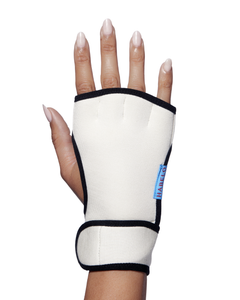You’ve heard of retinol. You’ve probably used it. And if you’ve experienced the peeling, redness, or sun sensitivity that can come with it, you’re not alone. But what if there was another way to get visible results — especially in areas that retinol often irritates, like the hands? Enter: peptides.
What Are Peptides in Skincare, and How Do They Work? Peptides are short chains of amino acids — the building blocks of proteins like collagen and elastin. When applied topically, they act as messengers, telling skin cells to boost collagen production, strengthen the moisture barrier, and calm inflammation. Some even help relax wrinkle-prone muscles, mimicking the effects of Botox — without the needle.
Peptides vs. Retinol: What’s the Difference? Retinol works by accelerating cell turnover and stimulating collagen production through controlled irritation. While effective, this can come with side effects: dryness, peeling, redness, and increased sun sensitivity.
Peptides, on the other hand, support the skin’s own renewal processes — without triggering inflammation. That means firmer, smoother skin with less risk of barrier disruption. In fact, peptides are increasingly being recommended by dermatologists for those with sensitive skin or anyone looking for long-term anti-aging without the drama.
Why Peptides Are Especially Good for Delicate Skin Not all areas of the skin are the same. The under-eyes, neck, and hands have thinner skin, less fat, and fewer oil glands — making them more prone to crepiness and irritation. Harsh actives like retinol and acids can be too aggressive here.
Peptides offer a smarter alternative. They gently restore firmness and elasticity by strengthening the skin’s structure and supporting collagen from within. No peeling, no downtime, and no barrier compromise.
The HAB-1™ Complex: A Smarter Peptide Strategy We created the HAB-1 Multi-Peptide Complex with one clear goal: to deliver visible, clinically backed results to the hands — without irritation. Rather than relying on a single ingredient, HAB-1 is a blend of synergistic peptides and one complementary active — each targeting signs of aging from multiple angles.
-
Palmitoyl Tripeptide-1 — collagen-stimulating and wrinkle-smoothing
-
Palmitoyl Tetrapeptide-7 — anti-inflammatory and protective
-
Palmitoyl Tripeptide-38 — firms and rebuilds dermal volume
-
N-Acetyl D-Glucosamine — an amino sugar that supports hydration and helps fade discoloration
This proprietary blend powers our Activating Hand Serum, helping to smooth, firm, and visibly renew delicate hand skin — with none of the harshness of retinol or acids.
Clinical-Backed Performance. Sensory Elegance. While the science is there (clinical studies show peptides can improve hydration, elasticity, and wrinkle depth in weeks), we designed the experience to be just as elegant. The Activating Hand Serum absorbs quickly, leaves no residue, and delivers a dewy, luminous finish — all in a clean, vegan formula.
The Bottom Line Retinol still has a place in skincare, but for delicate skin — especially the hands — peptides are proving to be a gentler, smarter alternative. With consistent use, peptide-based formulations like HAB‑1 offer real, visible results — without the side effects.
Experience the difference peptide science makes. Learn more about HAB‑1 or shop the Activating Hand Serum to see the transformation for yourself.
Peptides FAQ
Can you use peptides and retinol together? Yes. In fact, many dermatologists recommend layering peptides with retinol to help support skin repair and offset potential irritation. Just be sure to apply your peptide serum first, then follow with retinol.
Are peptides safe for sensitive skin? Absolutely. Peptides are generally very well tolerated, making them ideal for sensitive skin and for use on delicate areas like the hands, neck, and around the eyes.
How long does it take for peptides to work? Most users begin to see improved hydration and skin smoothness within the first 1–2 weeks, with firmer texture and visible wrinkle reduction typically noticeable by weeks 4–6.
Which peptides are best for anti-aging? Look for peptides like Palmitoyl Tripeptide-1, Palmitoyl Tetrapeptide-7, and Palmitoyl Tripeptide-38. These are well-studied for their roles in collagen stimulation, skin healing, and elasticity.
Where should I apply peptides? Anywhere you want to target aging — face, neck, décolletage, and hands. Our Activating Hand Serum is optimized for the thinner, more vulnerable skin on the hands (but people are loving it everywhere).





